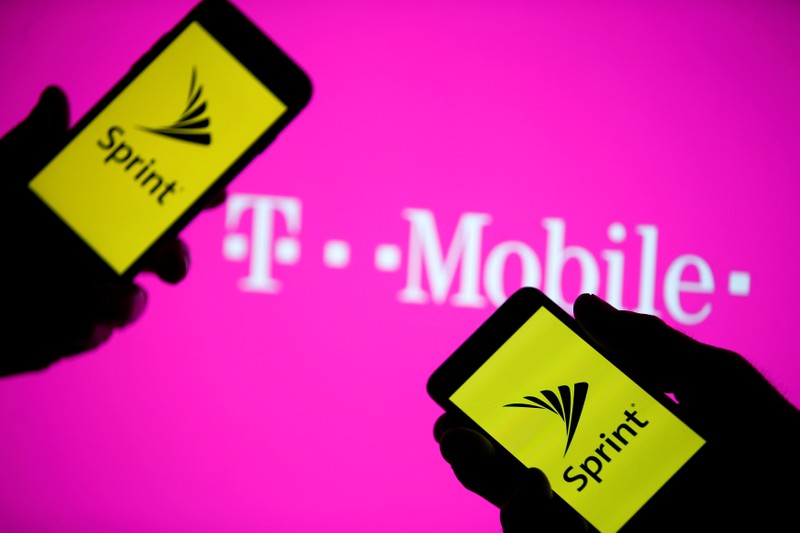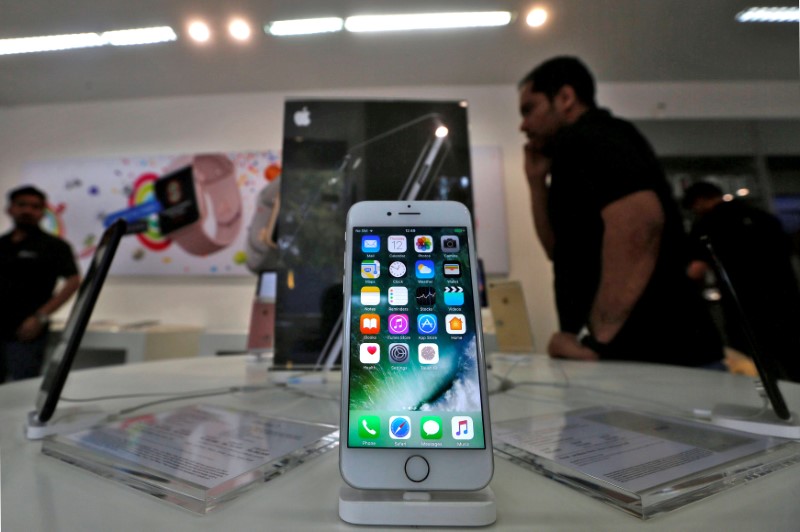
A smartphones with Sprint logo are seen in front of a screen projection of T-mobile logo, in this picture illustration taken April 30, 2018. REUTERS/Dado Ruvic/Illustration
May 2, 2018
By Sheila Dang and Diane Bartz
(Reuters) – The poorest U.S. consumers would lose most from the proposed tie-up of wireless carriers T-Mobile US Inc and Sprint Corp, according to consumer advocates who warned the combined company would hike fees for pre-paid and other low-cost mobile phone plans.
T-Mobile and Sprint announced a $26 billion all-stock deal on Sunday, saying they believed they could win over skeptical regulators because the merger would create thousands of jobs and help the United States beat China in creating 5G, the next generation mobile network.
But consumer groups complained the deal would lead to higher prices, hitting low-income people the hardest and leaving them fewer alternatives for communication.
Amparo Calcawell knows this well. The 62-year-old hairdresser has already lost her $50 per month Boost Mobile service due to a missed payment and fears higher prices will force her to find a new provider.
The New York City resident, speaking outside a Boost Mobile store in Manhattan holding a fistful of cash, needs her phone to keep in touch with family: “This is why a phone is so important.”
The Federal Communications Commission and Justice Department will likely review the proposed deal to determine if it would harm competition or if it is in the public interest.
While AT&T and Verizon dominate the U.S. wireless market overall, T-Mobile is the most popular among customers who make less than $75,000 per year, and Sprint’s pre-paid brand Boost counts 83 percent of its users in that income range, according to data from Kagan, S&P Global Market Intelligence data.
T-Mobile has 38 percent of the U.S. pre-paid market, while Sprint has 16 percent, which would give the combined company 54 percent, according to S&P.
“Lower income consumers are likely to lose the most options and face stiff price hikes because Sprint and T-Mobile are the only game in town for them,” said Gene Kimmelman, president of advocacy group Public Knowledge and a former chief counsel for the U.S. Justice Department’s Antitrust Division.
In its antitrust review, the Justice Department would likely view the prepaid market as a separate market, and if they do the companies could be in for a tough review, experts said.
“It’s clearly putting a more than 50 percent leader in the market. That will draw serious scrutiny,” said Caroline Holland, a Mozilla tech policy fellow who formerly served as chief counsel for competition and intergovernmental relations in DOJ’s antitrust division.
Consumers are already questioning the fewer choices among the major carriers. Sharron Cannon, 60, who lives in Harlem, New York, said she had canceled her Sprint plan because she was unhappy with the service and moved to T-Mobile, only to find out the companies were combining.
Now Cannon, an entrepreneur who depends on her phone to run her business, said she is concerned her bill will go up.
Spokespeople for T-Mobile and Sprint had no immediate comment for this story. AT&T and Verizon declined comment.
WHOLESALE WOES
T-Mobile and Sprint sell their airwaves to smaller wireless carriers that also serve low-income and budget-conscious customers, and a merger could hurt those carriers’ ability to negotiate for lower prices, said Stephen Stokols, chief executive of FreedomPop, which offers a free phone plan and uses Sprint’s network.
Retail wireless prices have declined over the past year and a half, but Stokols predicts price cuts will end after the merger.
FreedomPop has more than 2 million customers, and about 20 percent make less than $40,000 per year, Stokols said, adding about half of users are on the free phone service plan.
Since T-Mobile and Sprint have their own branded pre-paid users, and also power smaller pre-paid operators, the control the company would have over the market is concerning, Stokols said.
The deal is “good for the market, but bad for consumers,” Stokols said. “T-Mobile and Sprint have been driving down pricing previously. you won’t have competition at the bottom level anymore.”
(Reporting by Sheila Dang in New York and Diane Bartz in Washington; Editing by David Gregorio)

